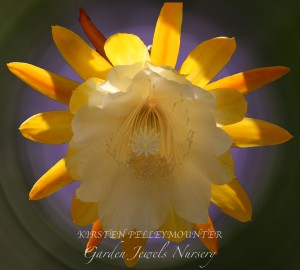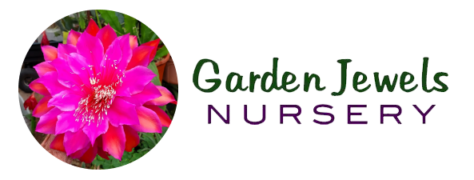|
Epi Care by Month November |
|
BUY
 You need to keep an eye on your plants as this could be a rainy time of the year. Epis don't like to be wet. This is a quiet time in the garden. Plants are resting preparing for the blooming season. We usually don't buy cuttings this time of year, but plants can always be purchased. If you have questions please do not hesitate to call our Nursery at 619.987-6251 or ask about availability or email us. You need to keep an eye on your plants as this could be a rainy time of the year. Epis don't like to be wet. This is a quiet time in the garden. Plants are resting preparing for the blooming season. We usually don't buy cuttings this time of year, but plants can always be purchased. If you have questions please do not hesitate to call our Nursery at 619.987-6251 or ask about availability or email us.
PLANT
You need to keep an eye on your plants as this could be a rainy time of the year. Epis don't like to be wet. This is a quiet time in the garden. Plants are resting preparing for the blooming season. We don't recommend planting during November unless you are experiencing a mild temperate climate. Call our Nursery at 619.987-6251 with questions or to ask about availability or email us.
FERTILIZE
Put off fertilizing mature Epis till February. However plants that are too young to flower the following season should continue to be fed during the dormancy period. with a balanced "slow released" fertilizer such as 10-10-10 or 14-14-14. Call Garden Jewels Nursery at 619-987-6251 if you have any questions or you can email us.
WATER
As always, continue to check your plants weekly for soil moisture. Autumn can mean heavy rains and high temperatures. This combination can lead to root rot. If you have this problem, you need to assess your soil mixture and pot drainage. You might need to add larger soil particles (sponge-rock/redwood bark) to your soil and you might need to drill additional holes in the bottom and/or sides of your plastic pots. If you are experiencing infrequent or no rain, water and mist your plants on a regular basis as described in the August watering directions. Call Garden Jewels Nursery at 619-987-6251 if you have any questions or you can email us.
PRUNE
This is a good time to check the legibility of name labels. Give your plants their end of season pruning. Blooms only grow from live areoles. Therefore, stems with few viable areoles will produce few flowers, and use energy that good stems could use to produce better blooms. A brown knot where the areole should be means that areole is dead. Sometimes the whole edge of a stem is dead, including the areoles. This is a candidate for trimming. Your epi will tell you which branches you need to discard. Branches that appear to be dehydrated and turning yellow as compared to greener and more fully hydrated ones should be removed. Break or snap any unwanted growth or use sterilized shears. You need to stay ahead of weeds. Oxalis, one of the most common and tenacious weeds seen in Epi pots, has a long tap root that must be removed or it will regenerate. Remember to wear latex gloves to protect your hands from the majority of epi spines. Call Garden Jewels Nursery at 619-987-6251 if you have any questions or you can email us.
PROTECT
You should mist your plants to keep them cool. If you are in an arid area – you should mist daily. It is best to mist in the evening. Call Garden Jewels Nursery at 619-987-6251 if you have any questions or you can email us.
INSPECT AND TREAT FOR PEST/DISEASE
Inspect your plants for insects. Scale and mealy bugs are usually the most prevalent pests at this time. Sprayed solutions of Malathion or insecticidal soaps are usually the best for most insects. If you experience an infestation of scale you might have to remove the plant from its pot a give it a complete scrub-down with a toothbrush saturated with one of the insecticides mentioned above. Remember to put out snail and slug bait. Call Garden Jewels Nursery at 619-987-6251 if you have any questions or you can email us.
TRANSPLANT
We re-pot to encourage growth, which will hopefully then encourage blooms in the Spring. As a general rule you should re-pot your Epi after it stops growing or stops blooming. every three to four years. The tendency is to re-pot too often. Epis like to have crowded roots in order to bloom better. This is an optimal time for rooting cuttings and "potting-up". You should pot “raw” cuttings with the areoles or notches facing upward in a dry to barely moist perlite no deeper than 1 ½ inches to 2 inches. Mist the cuttings for several weeks – do not saturate the perlite. Mist the cuttings twice weekly without getting the perlite wet. As your cuttings take root they will often produce roots from the areoles above the soil level and at the terminal end – this is a sure sign that your cutting is rooting beneath the perlite. Once your cuttings have taken hold (a slight tug that has resistance) they will begin to re-hydrate and are ready to be moved into regular soil-mix. After re-potting do not water for a week then water Lightly till new growth appears. "Potting-Up" an Epi is necessary when the plant has outgrown its pot and you want it to grow larger. This is a good time to "pot-up" your non-blooming Epis. The new pot should be just slightly larger than the old pot. Transplant the Epi into new mix tapping the mix gently to remove the air pockets. After "potting-Up" do not water for one to two weeks depending on the size of the plant. (smaller=shorter…larger=longer). Call Garden Jewels Nursery at 619-987-6251 if you have any questions or you can email us.
SPECIAL REQUIREMENTS
It is important that you give your epis adequate light while also protecting them from the southern sun exposure. Remember, epies do not want direct sunlight. You can damage your plants foliage with too much sun exposure in combination with higher temperatures and low humidity. Call Garden Jewels Nursery at 619-987-6251 if you have any questions or you can email us. You might have some off-season bloomers they will produce during the fall months, however, for the most part the blooming season has passed.
|

619-987-6251
Garden Jewels Nursery is San Diego's primary resource for Epiphyllums, or Epi- Hybrids & Species,
Oxypetalum, Orchid Cactus, Jungle Cactus, Hookeri, E. Crenatum and Semi Shade Plants.
Oxypetalum, Orchid Cactus, Jungle Cactus, Hookeri, E. Crenatum and Semi Shade Plants.